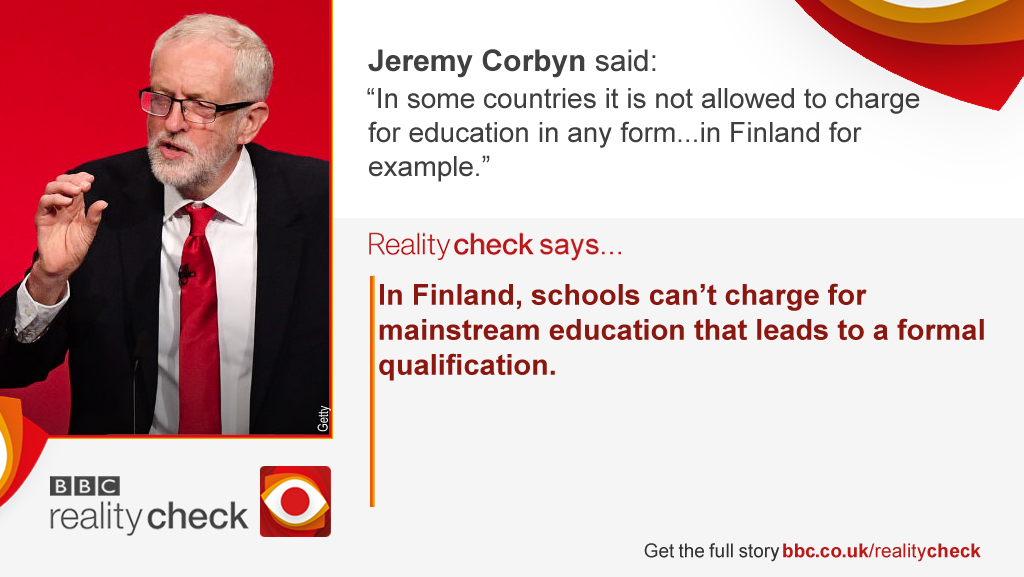Private schools: Is Jeremy Corbyn right about bans?
- Published

The claim: In some countries, charging for education is not allowed - for example, in Finland.
Reality Check verdict: It's true that in Finland it is not permitted to charge fees for mainstream education - and only 2% of its schools are run by non-governmental bodies. 91╚╚▒Č Reality Check was not able to find another example of a country with this rule.
Labour leader Jeremy Corbyn told 91╚╚▒Č Radio 4's Today programme: "In some countries, it is not allowed to charge for education in any form... in Finland, for example."
He was defending his party's decision to vote to integrate private schools into the state sector, if Labour won power.
So, is he right about Finland?
It's true schools there have not been allowed to charge fees for almost 50 years.
The Finnish Ministry of Education and Culture says: "Charging tuition in basic education is prohibited by the Finnish constitution."
Until the early 1970s in Finland, most secondary schools were run by private organisations. They were gradually brought under public control over the course of the decade, as part of wide-reaching educational changes, and their governing bodies were abolished.
Schools not operated by the government or local authorities are permitted - and are referred to as "private schools"- but they are publicly funded and free to pupils, although some charge parents and guardians registration fees.
And there are only 75 of them, making up just 2% of Finnish schools.
This doesn't mean all forms of paid-for education, including private tuition, are banned. But no-one can charge for mainstream schooling that leads to a formal qualification.
Finland is rare in the world for having a model like this - we weren't able to find another country with the same rules.
It has been held up as an example because the country scores so highly on the internationally recognised Programme for International Student Assessment (Pisa) for science, mathematics and reading.
Its 15-year-olds out-perform those in countries that do have private schools - although we can't say the lack of private schools itself is the reason.
The country also performs well for educational equality - that is, pupils have an equal chance of doing well at school regardless of their background.
The Organisation for Economic Cooperation and Development (OECD), which runs the Pisa testing, says of Finland: "No other country has so little variation in outcomes between schools - and the gap within schools between the top and bottom-achieving students is extraordinarily modest as well.
"Finnish schools seem to serve all students well, regardless of family background or socio-economic status."
A lack of fee-paying schools is not the only difference between the Finnish and other European models of education, though, says Prof Pasi Sahlberg, who has acted as an ambassador for the Finnish model around the world.
Pupils start school at the age of seven after funded early childhood education that focuses on play.
Teachers are paid better than they are in the UK, undergo much longer training courses, and have greater flexibility and control over what they teach.
"The main issue in Finland is not just absence of private schools but having education policy that protects education as a basic human right and public service," Prof Sahlberg says.
Finland also has a different demographic mix to the UK, with a far smaller and less diverse population, meaning issues around the funding and organisation of education are not necessarily comparable.